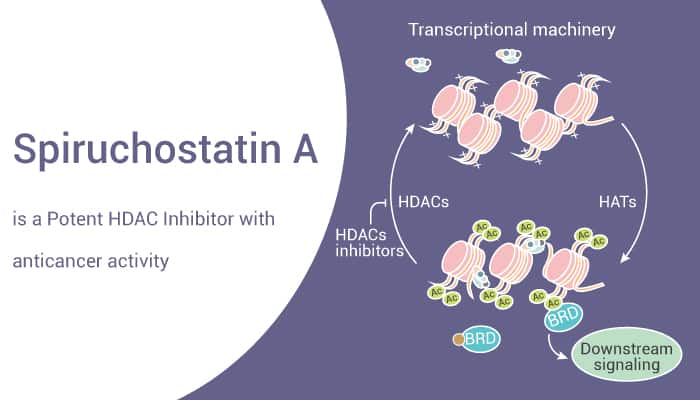Histone deacetylase (HDAC) is an enzyme that catalyzes the removal of acetyl functional groups from the lysine residues of histones and non-histones. Among other things, histone lysine acetylation is highly reversible. HDAC-catalyzed epigenetic modification of histone acetylation regulates chromatin structure and transcription, while non-histone deacetylation controls a variety of cellular processes. Also, HDAC is affected by multiple control mechanisms, including protein-protein interactions and post-translational modifications. Aberrant HDAC plays a key role in many human diseases. HDAC inhibitors are currently known to be potential anticancer agents and show promise for the treatment of many diseases.
Spiruchostatin A is a potent HDAC inhibitor with anticancer activity.

Spiruchostatin A, also known as OBP801, YM753, is a potent HDAC inhibitor with an IC50 value of 2 nM. It (3-100 nM, 12 or 24 h) can induce apoptosis in a dose-dependent manner in U937 cells and induce apoptosis in human myelomonocytic lymphoma cells in a time- and dose-dependent manner. Among them, Spiruchostatin A can significantly increase intracellular reactive oxygen species (ROS) formation. Also, it induces caspase activation and increases the cleaved form of caspase-3 and cytochrome-c release from mitochondria to cytosol at 30 nM. Besides, Spiruchostatin A (30 nM, 0-24 h) increases the acetylated histone H3 and H4 levels in a time-dependent manner and increases the percentage of sub-G1 cells from 2.3% to 27% in U937 cells.
Moreover, in WiDr xenograft nude mice model-bearing tumors, Spiruchostatin A (YM753) (i.v., 3 mg/kg, once) significantly inhibits tumor growth via accumulation of acetylated histones and p21WAF1/Cip1 protein. Among them, it can increase the acetylation of histones H3 and H4 even after 72 hours of administration. It shows that YM753 is a prodrug that is reduced to RedYM in tumor cells. Plasma concentrations of YM753 are 558 nM at 3 min and 15 nM at 15 min, in addition, plasma levels of RedYM are 65 nM at 3 min and 1.3 nM at 15 min.
In conclusion, Spiruchostatin A is a potent HDAC inhibitor that can induce apoptosis and has anticancer activity.
Reference:
[1] Seto E, et al. Cold Spring Harb Perspect Biol. 2014 Apr 1;6(4):a018713.
[2] Mati Ur Rehman, et al. Chem Biol Interact. 2014 Sep 25;221:24-34.
[3] Nobuaki Shindoh, et al. Int J Oncol. 2008 Mar;32(3):545-55.